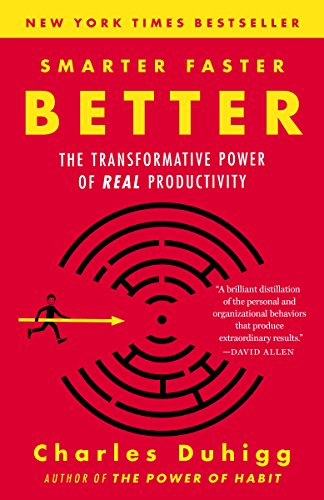Whether you’re trying to pick up a new skill, a foreign language, or learn how to use new technology, learning quickly isn’t just an admirable skill, but it’s something that could be demanded of you.
There are times when there is no room for forgetting information that your boss just told you. But what if we told you that there are some tips and tricks to becoming a memory master and picking up new information more quickly than you thought possible?
So, if you’re facing a test, have a new job with a lot of new information to take in, or just challenging yourself, here’s how. Today, we’re talking about how to learn faster and remember more without spending hours behind books! Let’s get started!

Smarter Faster Better
by Charles Duhigg
⏱ 13 minutes reading time
🎧 Audio version available
Chew Gum
That’s right. All those times your teacher yelled at you to stop chewing gum in class? Your teacher was off base. Chewing gum has powerful connections to faster learning and making stronger memories.
As you learn something new, pop a piece of delicious gum into your mouth. This is where the science part kicks in. Studies have proven that chewing gum increases activity in the hippocampus, which is a crucial area in the brain for memory.
The reasoning behind why gum works so well isn’t known. Scientists just know that it works! One theory believes that as you chew gum, you get an increase of oxygen, which works to improve your focus and attention, which in turn, helps you create more powerful connections in the brain as you learn new information.
Related to increased oxygen, a study tested participants and found that those who chewed gum during learning and memory tests had higher heart rate levels, which also brings more oxygen to their brain.
Listen to Audiobooks
This is a direct shortcut to reading books. The opposite of reading a book is listening to an audio one. The best thing about audio books is that you can listen to them while doing other tasks, such as working out, on your daily commute, as you cook, and whenever it’s appropriate to pop in earphones.
Contrary to popular belief, audiobooks provide the same benefits as physically reading a book. If both have the same material, then there is virtually no difference beyond your personal preference.
In 2018, an academic study stated that they found that students are capable of learning through both reading and listening. One is just more convenient.
Teach Someone Else (Or Pretend to Teach)
Don’t fall for the “Those who can’t do, teach” quote. Teaching, or in this case, pretending to teach, is a valuable tool in retaining information and speeding up how effectively you can learn.
Obviously, since this is a book-less method, there is no need for textbooks or notes in this class. You just have to consider how you would teach this information to someone. Think about the preparation teachers do before class. They prepare key points, they organize information, and overall prepare a coherent structure.
Ask any teacher or professor who taught or trained someone if they benefited and gained knowledge from the experience. The answer is likely to be yes.
Washington University in St. Louis did a study to prove this. They found that this change in mindset is more effective, especially since it makes you feel like you’re doing more than just trying to pass a test.
Learn in Short Bursts
You don’t need hours to learn something– you just need short bursts of time. The next time you need to pick up new material, try dedicating about 30 to 50 minutes.
Louisiana State University’s Center for Academic Success states that
“anything less than 30 is just not enough, but anything more than 50 is too much information for your brain to take in at a time.”
They advise that once those minutes have passed, take a five to ten minute break before starting another session.
This method is popular in Western Governors University, where the average student is known to earn a bachelor’s degree in two and a half years. Frequent learning sessions? Way better than longer, but less frequent ones.
Speak Up
Compared to reading silently, speaking up when you’re taking in new information is a “powerful mechanism for improving memory for selected information.”
Experts also say,
“Learning and memory benefit from active involvement. When we add an active measure or a production element to a word, that word becomes more distinct in long-term memory, and hence more memorable.”
Sleep More
You’ll be surprised at how much a good night’s sleep, or even what they call a “study nap” can help.
Even a short snooze can do wonders for improving your memory recall. While you sleep, your brain is going through the memory consolidation process.
In order to test memory strength, one study had participants memorize illustrated cards. They then told them to go on a 40 minute break. One group was tasked with the easiest job ever– to take a nap, and the other group stayed awake.
After the 40 minutes passed, and the sleep group was woken up, both groups were tested on how much they remembered the cards. Believe it or not, the sleep group performed dramatically better, retaining 85% of the patterns they saw before they slept in comparison to the awake group who only remembered, on average, 60% of the cards.
In our quest to learn more, sleep is something that we foften orego, but sleep deprivation wreaks havoc on your brain’s ability to take in new information and actually commit it to memory.
Whether you’re trying to learn a physical skill, learn a new language, or master a new hobby, the key is to taking nap breaks between sessions. Sleeping more equals more learning. When you introduce sleep between these practice sessions, you reduce the time needed to learn and relearn.
Exercise More
There are a plethora of methods when it comes to exercising. Other than the usual spiel about keeping fit and having a healthy body, exercising on a regular basis helps improve memory recall. When you work out, your body experiences an increase in a chemical called BDNF, which stands for brain-derived neurotrophic factor.
This protein supports the function, growth, and survival of brain cells. High-intensity exercises are even a more useful tool, as they have been found to result in significant improvement in high-interference memory.
Change Your Method
This relates to when you’re trying to learn a new motor skill. When you change your methods, the way you practice that skill, you’re actually mastering it faster. A study at Johns Hopkins University School of Medicine proves this.
Participants were told they were going to learn a computer-based task over a couple of sessions. They found those who used a different learning technique during their second sessions performed significantly better than those who just repeated the same method.
Pablo A. Celnik, a professor of physical medicine and rehabilitation and a senior study author, said, “if you practice a slightly modified version of a task you want to master, you actually learn more and faster than if you just keep practicing the exact same thing multiple times in a row.”
So, just repeating something over and over again, no matter how much you’re focused, will not only not help you improve as quickly as you could, but it may actually decrease your skill.
Constantly Test Yourself
The key to being a master of learning quickly and remembering more– without wasting hours on end behind books is testing yourself. Not with a pen and paper, but by being competitive with yourself. How so? Self-testing is one of the most effective ways to speed up the entire learning process.
If you get something wrong, then you get the benefit of added context. The next time you encounter this particular problem, equation, task, or step in a skill, you are more likely to remember the correct answer because you looked it up before.
Let’s say you’re learning a new language. To avoid wasting hours practise and rehearing verb conjugation, test yourself on what you already know. Recite the major rules, do whatever you can to jog your memory.
When there’s a gap in your information, look it up, and you’ll never make the same mistake again. When you find yourself confidently rattling off information and French and Latin verbs like a master, you’ll find yourself more receptive to learning new things more quickly.
What Is Snapreads?

With the Snapreads app, you get the key insights from the best nonfiction books in minutes, not hours or days. Our experts transform these books into quick, memorable, easy-to-understand insights you can read when you have the time or listen to them on the go.



